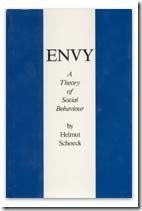I've just been reading a magnificent speech on the nature and motivation of capitalism's enemies, delivered by Larry Sechrest at the recent Mises Institute conference. He began by delivering this tribute to one of my heroes, one of capitalism's great defenders, Ludwig von Mises, given in the words of another of capitalism's great heroes:
Ayn Rand once made an observation that I think is germane to Mises... She exhorted her readers to "observe also the intensity, the austere, the unsmiling seriousness with which an infant watches the world around him. (If you ever find, in an adult, that degree of seriousness about reality, you will have found a great man)." In the course of his pursuit of truth, this great man unfailingly exhibited what I like to think of as a "dignified ruthlessness." To comprehend complex phenomena was what was important. To grasp reality was the objective that fueled Mises's life, not popularity, not winning debates, not currying political approval. Moreover, this quest was to be undertaken within an interpersonal context of civility and even elegance.
All that is so alien to our present world...
 And sometimes even, I confess, to this blog! But this reminder and Sechrest's tribute is not even the main part of why his speech is so magnificent. Why it is essential reading is its masterly summary of the anti-capitalist mentality:
And sometimes even, I confess, to this blog! But this reminder and Sechrest's tribute is not even the main part of why his speech is so magnificent. Why it is essential reading is its masterly summary of the anti-capitalist mentality:
... how can anyone find capitalism objectionable at all once one recognizes that it has — even in its attenuated form — increased the standard of living so dramatically that an average person now daily enjoys "luxuries" which hereditary monarchs could not boast of a mere 200 years ago? Mises offers two basic answers to that question: envy and ignorance.
These are not mere words. Sechrest analyses and dissects the two attributes of the anti-capitalist mentality, and adds another: malice. "Consider what follows if one couples the repugnant urge toward envy with a broad misperception of reality." The result can be seen in comments around the blogosphere, and in headlines and press releases in your daily news.
 You need to read his words, or see or listen to his speech to fully appreciate the analysis, and the importance of understanding is immense. The stakes in the battle against the envious, the malicious and the ignorant are high, he says - as high as civilization itself.
You need to read his words, or see or listen to his speech to fully appreciate the analysis, and the importance of understanding is immense. The stakes in the battle against the envious, the malicious and the ignorant are high, he says - as high as civilization itself.
To his everlasting credit, Mises fully comprehended what some free-market advocates still have not: namely, that the debate over capitalism is not merely about which socioeconomic system will more efficiently produce goods and services, nor about which will accord more closely with consumers' individual preferences. He understood that the debate involved that and much more besides. He understood that to attack capitalism was to attack civilization itself, to attack the role of reason in man's life — and thus to undermine the value of life itself. As he put it with characteristic candor, present day collectivists "advocate measures which are bound to result finally in general impoverishment, in the disintegration of social cooperation under the principle of the division of labor and in a return to barbarism" ...
Where, then, do we stand? As we know, socialism is calculational chaos. Rational appraisement and allocation are eternally elusive. It is a gigantic negative-sum game in which each player quickly grabs a piece of the pie, and all the while the pie shrinks before the players' eyes. The welfare/warfare state, the interventionist state, is no improvement. Each intervention begets yet another. Bureaucracy is the only "industry" guaranteed to experience growth. Each new regulation taxes the private sector, relentlessly shifting resources out of the hands of the productive, and into the hands of the unproductive. Capitalism is the only positive-sum game in town.
In short, the case against capitalism is indefensible. It is smoke and mirrors. It is rooted in envy and malice. It is fueled by a stunning ignorance of sound economics, which is part and parcel of a broader rejection of reason itself. These anti-capitalists, these New Barbarians will — if they get their way — finally destroy not only capitalism, but also education, science, technology, literature, art, individual rights, prosperity, in fact, civilization itself...
The barbarians are at the gates, says Sechrest, and have been there now a'knocking for years. If you're a defender of civilization, then you must set aside time to read and consider his speech to understand the nature of your enemy, and how once fully understood, the enemy is ripe for destruction.
No comments:
Post a Comment